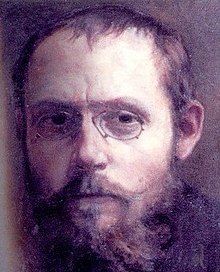夏尔·贝玑
此條目可参照外語維基百科相應條目来扩充。 (2022年1月1日) |
夏尔·皮埃尔·贝玑(法語:Charles Pierre Péguy,法语发音:[ʃaʁl pjɛʁ peɡi];1873年1月7日—1914年9月5日),法国诗人、散文家、编辑,哲学思想受到了社会主义和民族主义的影响。1908年,贝玑皈依天主教。自此,其作品开始受到天主教的强烈影响。[1][2][3]第一次世界大战初期,贝玑在第一次马恩河战役中于维勒鲁瓦阵亡。
| 夏尔·贝玑 | |
|---|---|
 | |
| 出生 | Charles-Pierre Péguy 1873年1月7日 奥尔良 |
| 逝世 | 1914年9月5日 勒普莱西莱韦克 |
| 母校 |
|
| 职业 | 作家、诗人、散文家、新聞工作者、哲學家、剧作家、军人、文学评论家 |
| 奖项 | 法兰西烈士 |
| 网站 | http://www.charlespeguy.fr/ |
| 签名 | |
 | |
参考资料
编辑- ^ "Peguy's Catholicism was closely allied with his love of France. Of him, as also of Psichari, it might almost be said that they were Catholics because they were Frenchmen. A non-Catholic Frenchman seemed a monstrosity, something cut off from the true life of his country. Some Catholicism is international or indifferent to country, with almost the motto, 'What matters country so long as the Church survives?' But that is not the Catholicism of these young Frenchmen, nor the Catholicism of the recent religious revival." – Rawlinson, Gerald Christopher (1917). "Charles Péguy," in Recent French Tendencies from Renan to Claudel. London: Robert Scott, p. 121.
- ^ "In France the classic type of the fervent but non-practising Catholic was probably best represented by Charles Péguy". — Kuehnelt-Leddihn, Erik von (1952). Liberty or Equality (页面存档备份,存于互联网档案馆). Caldwell, Idaho: The Caxton Printers, Ltd., p. 194.
- ^ Ralph McInerny. "Charles Péguy" 互联网档案馆的存檔,存档日期30 May 2010., 2005.